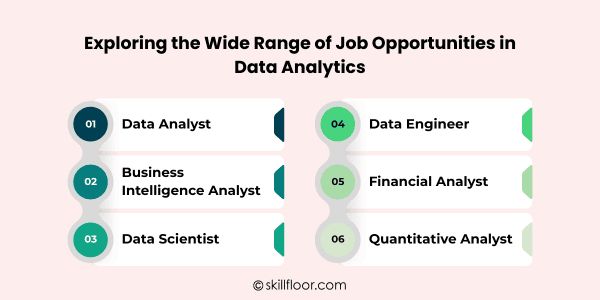Exploring Career Opportunities in Data Analytics
Discover exciting career opportunities in data analytics, explore top roles, key skills, salaries, and growth paths, and see why now is the right time to start.

In today’s digital landscape, data has become one of the most essential assets for businesses. Companies of all sizes—ranging from small startups to large multinational corporations—are leveraging data to make informed decisions, enhance customer service, and develop innovative ideas. Consequently, the demand for individuals skilled in data analysis has surged. For instance, there are currently 2.7 million unfilled positions in data analytics worldwide, and job growth in this field is expected to be 25% faster than the average growth rate by 2032. Exploring career opportunities in data analytics can help professionals identify the right path and understand the skills needed to thrive.
Analyzing data is not the only aspect of working in data analytics. It's about identifying practical trends, providing context for the data, and assisting teams in making more informed decisions. Approximately 75% of businesses now claim that data analytics helps them make critical business choices, and the majority of businesses are investing more in career opportunities in data analytics through training, hiring, and advanced tools.
Why Data Analytics Careers Are in Demand
The demand for analytics specialists has experienced ongoing rise as companies try to become more efficient and competitive. This need is driven by several major trends:
-
Exponential Data Growth: Organizations are producing huge amounts of data every day due to the acceleration of digital transformation, which is driving up demand for analytics experts.
-
Decision-Making Based on Insights: Companies increasingly rely on analytics to guide strategy, optimize operations, and make educated business decisions in real time.
-
Wide Applicability: Analytics skills are required across industries such as healthcare, banking, retail, sports, and manufacturing for smarter, faster decision-making.
-
Digital-First Operations: Remote work, e-commerce, and automation create the need for analytics professionals to enhance efficiency and consumer experience.
-
Competitive Advantage Creation: Businesses utilizing analytics acquire measurable benefits, outperform competitors, and uncover market possibilities faster than companies without analytics insights.
-
Innovation And Product Development: Data analytics helps organizations study customer behavior, spot trends, and develop creative products and services that satisfy market demand.
As the global demand for data analysts is growing, related roles such as data scientists, data engineers, and business intelligence professionals are also increasing significantly across multiple sectors globally, making data analytics skills more valuable than ever.
Exploring the Wide Range of Job Opportunities in Data Analytics
Data analytics encompasses a wide range of employment roles with varying duties, necessary skills, and business impact, providing people with a variety of options to successfully specialize and advance their careers.
1. Data Analyst
If you’re wondering how to become a data analyst, this position focuses on evaluating data to assist businesses in making wiser decisions. Using reports, dashboards, and visualizations, analysts transform unprocessed data into insights that may be put to use.
Job Responsibilities:
-
Collecting, cleaning, and organizing data from multiple sources
-
Creating reports and visualizations to communicate trends and findings
-
Supporting business decisions by analyzing patterns and key metrics
Required Skills:
-
Strong knowledge of Excel, SQL, and data visualization tools like Tableau or Power BI
-
Basic understanding of statistics and data interpretation
-
Good problem-solving and communication skills
Average Salary:
In India, the average salary for a data analyst is around ₹5,85,000 per year, though it varies depending on experience, location, and company.
2. Business Intelligence Analyst
If you're interested in becoming a BI analyst, the primary duty of this position is to transform data into strategic insights that assist companies in making wise decisions. BI Analysts develop dashboards, generate reports, and monitor critical indicators.
Job Responsibilities:
-
Developing and maintaining BI dashboards and reports to track business performance
-
Analyzing complex data to identify trends, opportunities, and risks
-
Collaborating with stakeholders to support strategic and operational decision-making
Required Skills:
-
Proficiency in BI tools like Power BI, Tableau, or QlikView
-
Strong SQL skills and understanding of databases
-
Analytical thinking and effective communication to explain findings to business teams
Average Salary:
In India, a BI Analyst typically earns around ₹6,50,000 per year, depending on experience, company size, and location.
3. Data Scientist
If you're interested in working as a data scientist, this position focuses on analyzing complex data to find patterns and assist companies in making more intelligent, data-driven choices.
Job Responsibilities:
-
Collecting, processing, and analyzing large and complex datasets
-
Using statistical methods and machine learning to identify trends and patterns
-
Building predictive models to inform business strategy and decision-making
Required Skills:
-
Strong background in computer science, mathematics, or statistics
-
Proficiency in programming languages like Python and R
-
Knowledge of machine learning algorithms and data visualization tools
Average Salary:
In India, a Data Scientist earns an average of around ₹12,00,000 per year, though this varies with experience, skills, and the company.

4. Data Engineer
If you’re interested in becoming a Data Engineer, this role focuses on building and maintaining the systems that allow organizations to store, process, and analyze data efficiently.
Job Responsibilities:
-
Designing, constructing, and managing scalable data pipelines and databases
-
Ensuring data is clean, reliable, and easily accessible for analysts and scientists
-
Collaborating with teams to integrate data from multiple sources for analytics
Required Skills:
-
Strong knowledge of SQL, Python, and data warehousing tools
-
Experience with ETL processes, cloud platforms (AWS, Azure, GCP), and big data frameworks
-
Problem-solving skills and ability to optimize data workflows
Average Salary:
In India, a Data Engineer typically earns around ₹9,00,000 per year, depending on experience, skills, and organization.
5. Financial Analyst
If you’re considering a career as a Financial Analyst, this profession focuses on reviewing financial information to drive business and investment decisions. Professionals in this profession assist companies manage budgets, review performance, and find development prospects.
Job Responsibilities:
-
Analyzing financial statements, market trends, and investment performance
-
Using financial data analytics to uncover patterns, forecast revenue, and support decision-making
-
Preparing reports and recommendations for management and stakeholders
Required Skills:
-
Strong knowledge of finance, accounting, and business principles
-
Proficiency in Excel, financial modeling, and data visualization tools
-
Analytical thinking and the ability to interpret complex financial data
Average Salary:
In India, a Financial Analyst earns an average of around ₹6,00,000 per year, though this varies based on experience, location, and organization.
6. Quantitative Analyst
If you're interested in working as a quantitative analyst, this position focuses on managing risk, analyzing financial markets, and directing investment choices using statistical and mathematical techniques.
Job Responsibilities:
-
Developing mathematical models to analyze financial data and forecast market trends
-
Using statistical tools to identify patterns and manage risks
-
Collaborating with traders, portfolio managers, and risk teams to support decisions
Required Skills:
-
Strong knowledge of mathematics, statistics, and finance
-
Proficiency in programming languages like Python, R, or MATLAB
-
Analytical thinking and problem-solving skills for complex financial challenges
Average Salary:
In India, a Quantitative Analyst typically earns around ₹10,00,000 per year, depending on experience, company, and location.
High-Demand Industries for Data Analytics Jobs
Tech companies are no longer the only ones using data analytics. Across the worldwide job market, various areas are actively hiring analytics talent:
-
Finance & Banking: Analytics specialists serve financial institutions by analyzing risk, anticipating market trends, identifying fraud, optimizing investments, and personalizing services to improve client pleasure and overall profitability.
-
Healthcare: Healthcare providers employ analytics to increase patient outcomes, streamline operations, reduce costs, assist clinical research, predict illness patterns, and improve overall healthcare delivery efficiency.
-
E‑commerce & Retail: Pricing, inventory control, consumer behavior, marketing campaigns, product recommendations, and the optimization of overall sales and profitability strategies are all influenced by analytics in online retail.
-
Technology & SaaS: Analytics are used by digital organizations to enhance customer experience, monitor user engagement, guarantee data security, optimize product performance, and promote informed technological development and operational efficiency.
-
Marketing & Advertising: Marketers may use analytics to monitor campaign performance, calculate return on investment, optimize targeting, comprehend audience behavior, improve messaging, and develop highly successful, data-driven marketing campaigns.
-
Energy & Utilities: The energy sector employs data analytics to balance supply-demand, estimate consumption, minimize operational inefficiencies, increase sustainability initiatives, and optimize energy production and distribution processes.
Skills Required to Build a Career in Data Analytics
To effectively evaluate data, solve problems, and communicate findings, a career in data analytics demands a combination of technical know-how, sophisticated analytical skills, and strong soft skills. Taking a data analytics course might help launch your journey and enhance these critical abilities.
Technical Skills
-
SQL and database management
-
Python or R programming
-
Excel and spreadsheet analysis
-
Data visualization (Tableau, Power BI)
Advanced Capabilities
-
Statistical analysis and modeling
-
Machine learning basics
-
Data cleaning and preprocessing
-
Predictive and prescriptive analytics
Soft Skills
-
Critical thinking and problem-solving
-
Effective communication and storytelling
-
Business acumen and domain knowledge
-
Collaboration and teamwork
In addition to preparing you for employment, mastering these technical, advanced, and soft skills will set you up for long-term success and help you succeed in the rapidly expanding profession of data analytics.
Understanding Salary Trends Across Data Analytics Careers
Professionals can make better selections when they are aware of global pay trends. A data analytics career provides competitive compensation, rapid growth, and opportunity across industries, making it one of the most fulfilling paths today.
-
The salary of a Data Analyst in India varies by experience: Entry-level professionals earn around ₹35,000/month (₹4,20,000/year), mid-level earns ₹60,000/month (₹7,20,000/year), and senior-level can reach ₹1,20,000/month (₹14,40,000/year).
-
For a Business Intelligence Analyst, entry-level monthly salaries start at ₹40,000 (₹4,80,000/year), mid-level professionals earn ₹75,000/month (₹9,00,000/year), and senior roles can earn up to ₹1,50,000/month (₹18,00,000/year).
-
A Data Scientist earns approximately ₹50,000/month (₹6,00,000/year) at entry-level, ₹1,00,000/month (₹12,00,000/year) at mid-level, and ₹2,00,000/month (₹24,00,000/year) for senior positions.
-
Data Engineers start at around ₹45,000/month (₹5,40,000/year), with mid-level professionals earning ₹1,00,000/month (₹12,00,000/year), and senior-level experts reaching ₹1,80,000/month (₹21,60,000/year).
-
For a Financial Analyst, entry-level professionals earn ₹30,000/month (₹3,60,000/year), mid-level ₹60,000/month (₹7,20,000/year), and senior-level salaries can go up to ₹1,20,000/month (₹14,40,000/year).
-
A Quantitative Analyst typically earns ₹60,000/month (₹7,20,000/year) at entry-level, ₹1,20,000/month (₹14,40,000/year) at mid-level, and ₹2,50,000/month (₹30,00,000/year) for senior positions.
Key Factors Affecting Salaries in Data Analytics
Salaries in data analytics vary greatly due to many variables, including skills, experience, sector, location, and role specialization, making it crucial to understand what drives remuneration.
Key Factors Affecting Salaries:
-
Experience Level: Entry-level experts earn less than mid or senior-level, whereas seasoned analysts command better pay due to proven competence, leadership ability, and strategic effect on business outcomes.
-
Technical Skills: Earnings potential is greatly increased by proficiency with technologies like SQL, Python, R, and BI platforms because employers favor people who can effectively handle complicated datasets.
-
Industry: Due to their profitability, reliance on data, and fierce competition for analytical talent, industries like finance, healthcare, and technology frequently pay more than non-profits or education.
-
Location: Geographical factors affect salaries; in comparison to smaller cities or rural areas, metro areas or places with high living costs usually pay more.
-
Role Specialization: Higher compensation is demanded for advanced positions like data scientist, data engineer, or quantitative analyst because of their technical complexity, strategic importance, and lack of qualified workers.
-
Education & Certifications: Degrees in analytics, statistics, or computer science and certifications like Tableau, Power BI, or machine learning enhance credibility, often resulting in better compensation packages.
The Future Outlook of Data Analytics Careers
As digital data continues to grow and businesses increasingly rely on insights for decision-making, the analytics job market is expected to expand. Emerging technologies such as automation, cloud computing, artificial intelligence, and machine learning are also creating new positions and niches within the analytics field.
This demand offers numerous opportunities for career flexibility and advancement, regardless of your level of experience or interest in further specialization. Over the next ten years, one of the most essential job skills will be the ability to translate complex data into clear business implications.
Moreover, as organizations across industries increasingly adopt data-driven cultures, experts who combine analytical competence with domain knowledge and excellent communication abilities will be highly sought after. Top performers will be distinguished from the others by their constant learning, flexibility, and mastery of new techniques, guaranteeing that a career in data analytics will continue to be both highly rewarding and relevant in the years to come.
Understanding trends and insights is crucial in today's data-driven environment. Now is the ideal time to look into Career Opportunities in Data Analytics! This area is more than simply math; it's about solving actual issues, making wiser choices, and witnessing the daily effects of your work. The variety of positions—from data scientist to data analyst—offers fascinating career possibilities that align with your interests and strengths, regardless of your level of experience. You can open doors to fulfilling jobs by developing the proper combination of technical skills, analytical thinking, and communication qualities. Today's Career Opportunities in Data Analytics entail entering a field that is adaptable, prepared for the future, and full of opportunities.






























































